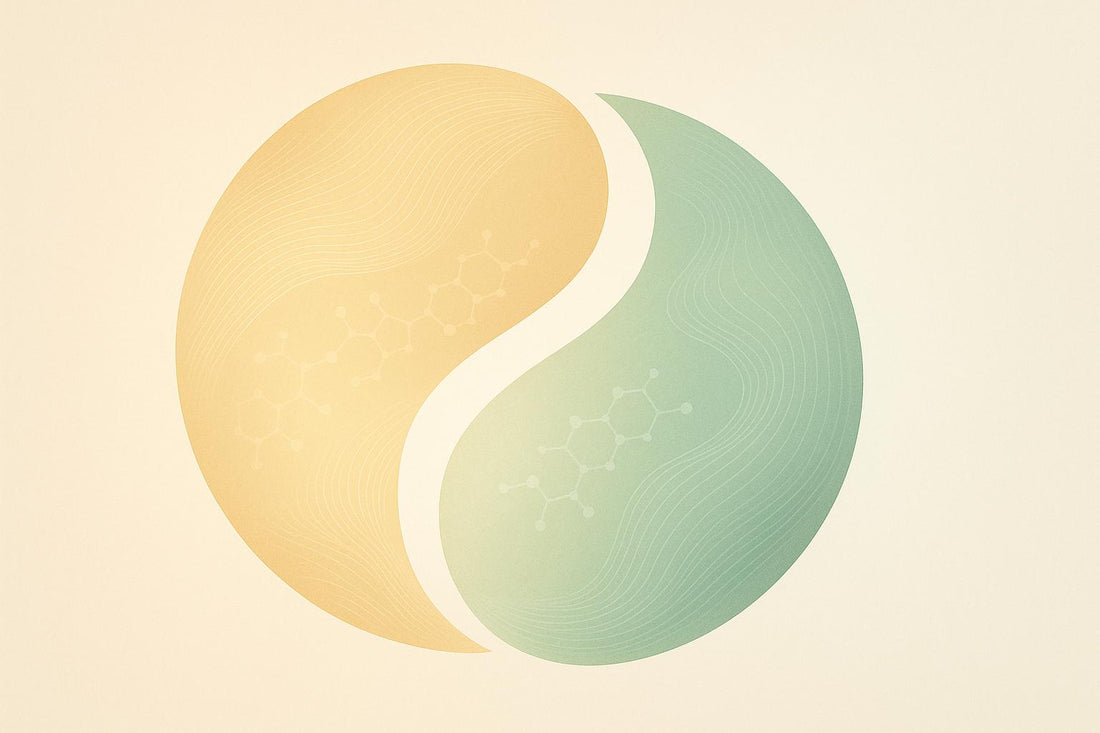Melatonin and cortisol are two key hormones that regulate your internal clock, affecting sleep, energy, and overall health. Melatonin rises at night to help you sleep, while cortisol peaks in the morning to energize you for the day. Disruptions in their balance - caused by factors like stress, artificial light, or aging - can lead to sleep problems and health issues.
Quick Overview:
- Melatonin: Nighttime hormone that promotes sleep and regulates circadian rhythm.
- Cortisol: Morning hormone that boosts energy and manages stress.
| Characteristic | Melatonin | Cortisol |
|---|---|---|
| Peak Release Time | Night, peaking early morning | Morning, shortly after waking |
| Primary Functions | Sleep initiation, circadian rhythm | Energy boost, stress management |
Understanding and monitoring these hormones can help maintain a healthy rhythm, especially as you age or face lifestyle disruptions.
Essentials: Master Your Sleep & Be More Alert When Awake
Melatonin's Role in Sleep Cycles
Melatonin, a hormone produced by the pineal gland, plays a key part in signaling the start of nighttime for the body. Below, we'll explore its release timing, impact on sleep, and sensitivity to environmental changes.
Production and Release Timing
As evening light dims, the pineal gland begins releasing melatonin. Levels rise throughout the night, helping the body prepare for sleep, and drop again with the arrival of daylight.
Sleep Cycle Effects
Melatonin does more than just make you feel sleepy. It helps regulate the flow between REM and non-REM sleep phases, which are essential for quality rest and recovery.
Sensitivity to Light
Melatonin production is highly influenced by light exposure. Bright or blue-enriched light can suppress its release, while darkness encourages it, reinforcing the body's natural sleep-wake rhythm.
Cortisol's Daily Rhythm
Cortisol, often called the "wake-up hormone", plays a key role in managing energy levels and stress responses throughout a 24-hour cycle.
24-Hour Release Pattern
Cortisol levels follow a daily rhythm. They hit their highest point shortly after waking - this is known as the Cortisol Awakening Response (CAR). From there, levels gradually drop as the day progresses, reaching their lowest point at night. This pattern helps the body stay active during the day and wind down for recovery at night.
Energy and Stress Functions
In the morning, cortisol provides a boost by increasing glucose for energy, enhancing alertness, supporting cardiovascular function, and balancing the immune system. As the day goes on and cortisol levels drop, the body shifts into rest mode, working in sync with the evening rise of melatonin.
Environmental Effects
Several factors can influence cortisol's natural rhythm:
- Morning light exposure: Bright light in the morning helps elevate cortisol, reinforcing wakefulness.
- Exercise timing: Morning workouts align with cortisol's natural peak, while intense exercise in the evening may interfere with its decline.
- Chronic stress: Long-term stress can reduce the morning surge and keep cortisol levels elevated at night.
sbb-itb-4f17e23
Melatonin vs. Cortisol: Key Differences
Melatonin and cortisol are essential hormones that work together to regulate our body's internal clock. Each has a specific role in maintaining our daily biological rhythm, and understanding their differences can provide insight into circadian health.
Here’s a quick comparison:
| Characteristic | Melatonin | Cortisol |
|---|---|---|
| Peak Release Time | Released mostly at night, peaking in early morning hours | Peaks in the early morning shortly after waking |
| Primary Functions | Helps with sleep initiation and regulates circadian rhythm | Boosts energy and manages stress responses |
When these hormones deviate from their usual patterns, it can be a sign of circadian imbalance. For instance, lower melatonin levels at night or a missing cortisol peak in the morning can disrupt the natural rhythm. A well-functioning cycle typically includes high melatonin levels at night and low cortisol, with the opposite pattern in the morning. Monitoring these hormones can be a valuable way to assess and maintain circadian health.
Research and Clinical Uses
Melatonin and cortisol measurements play a key role in diagnosing sleep disorders and understanding changes related to aging. These biomarkers provide valuable insights that help healthcare professionals make informed treatment decisions.
Sleep Disorder Testing
Sleep clinics often analyze hormone levels at different times of the day to create detailed profiles. Salivary testing, a non-invasive method, is commonly used to identify issues like delayed or advanced sleep phase disorders or the effects of shift work. These insights allow for more tailored treatment plans.
Age-Related Changes
As people age, circadian rhythms tend to shift. Research has shown that melatonin levels decrease and cortisol patterns change, leading to sleep disruptions. Monitoring these hormones regularly helps healthcare providers address these changes and improve sleep and overall wellness in older adults.
MASI Longevity Science's Approach

MASI Longevity Science takes a science-based approach to support cellular health and circadian rhythm balance. Their supplements, such as NMN and Resveratrol, are developed using research-backed methods. Manufactured in Germany with pharmaceutical-grade raw materials and independently tested in Switzerland for purity and safety, these products aim to align with the body's natural rhythms and support healthy aging.
This approach emphasizes the importance of maintaining hormonal balance for overall health and vitality throughout life.
Conclusion
Melatonin and cortisol play crucial roles in managing our circadian rhythms, working together to regulate sleep and wake cycles. While melatonin encourages sleep, cortisol helps promote alertness, creating a delicate balance essential for overall health.
Studies indicate that as we age, keeping these hormone levels in check becomes increasingly important. Imbalances can lead to various health issues, and factors like irregular sleep patterns, excessive screen time, and stress can disrupt this harmony. Research from institutions like Harvard Medical School and Mayo Clinic has contributed to the development of supplements by MASI Longevity Science, designed to support cellular health and maintain circadian balance.
This connection between melatonin and cortisol highlights how our bodies rely on precise rhythms. By making informed lifestyle choices and using evidence-based strategies, we can help maintain these natural cycles, supporting long-term health. MASI Longevity Science continues to focus on providing solutions rooted in scientific research to promote healthy circadian function.
FAQs
How do aging-related changes in melatonin and cortisol levels affect sleep and overall health?
As we age, melatonin levels naturally decline, which can disrupt our sleep-wake cycle and lead to difficulties falling or staying asleep. This decrease may also impact the body's overall circadian rhythm, which plays a vital role in regulating various biological processes.
At the same time, cortisol - often called the stress hormone - may become dysregulated with age. Elevated nighttime cortisol levels can further disrupt sleep quality and contribute to health issues like increased stress or fatigue over time.
Supporting healthy circadian rhythms is essential for maintaining vitality and well-being as we age. By prioritizing sleep health and managing stress, we can help mitigate the effects of these hormonal changes on our overall health.
What lifestyle habits can help regulate melatonin and cortisol levels for better circadian health?
Maintaining a healthy balance between melatonin and cortisol is essential for supporting your circadian rhythm, which influences sleep, energy levels, and overall well-being. Here are some effective lifestyle habits to consider:
- Stick to a consistent sleep schedule: Go to bed and wake up at the same time every day, even on weekends, to reinforce your natural sleep-wake cycle.
- Limit exposure to blue light at night: Reduce screen time or use blue light filters in the evening to encourage melatonin production.
- Get morning sunlight: Bright light exposure early in the day helps regulate cortisol levels and signals your body that it's time to wake up.
- Manage stress effectively: Practice relaxation techniques like meditation, deep breathing, or yoga to prevent cortisol spikes.
- Avoid caffeine and heavy meals late in the day: Both can disrupt melatonin production and interfere with sleep quality.
Adopting these habits can help promote a healthier circadian rhythm by supporting the natural balance of melatonin and cortisol in your body.
How do melatonin and cortisol levels help in identifying and managing sleep disorders?
Monitoring melatonin and cortisol levels can provide valuable insights into your circadian rhythm, which plays a crucial role in regulating sleep-wake cycles. Melatonin, often called the 'sleep hormone,' peaks at night to promote sleep, while cortisol, the 'stress hormone,' typically rises in the morning to help you wake up and stay alert.
Disruptions in the timing or levels of these hormones can indicate underlying sleep disorders, such as insomnia or circadian rhythm disorders. By analyzing these biomarkers, healthcare professionals can better diagnose issues and tailor treatments, such as light therapy, melatonin supplements, or lifestyle adjustments, to restore healthy sleep patterns.




